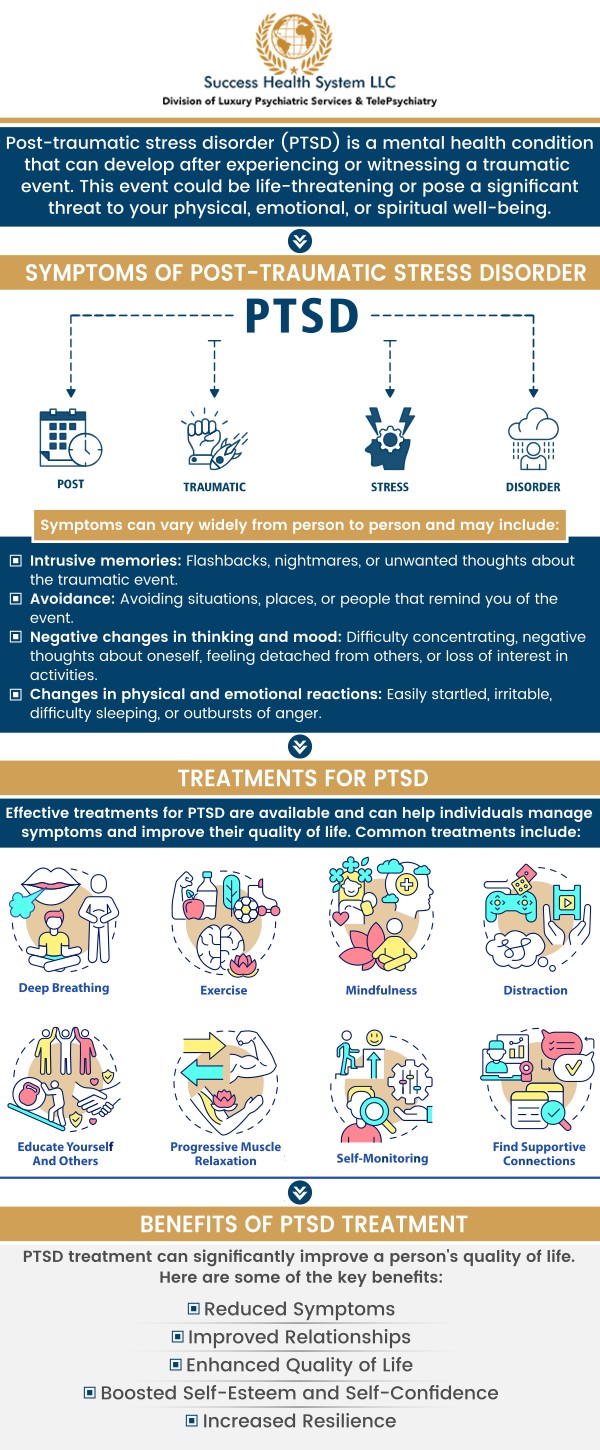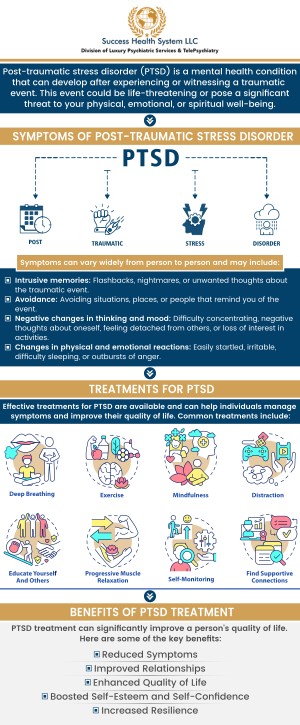PTSD Psychiatrist in Independence, MO
Success Health System LLC offers effective treatment for post-traumatic stress disorder (PTSD). PTSD can cause distressing symptoms such as flashbacks, nightmares, and heightened anxiety, often resulting from exposure to a traumatic event. Board-certified psychiatrist and mental health specialist Dr. Moses Tabe Ambilichu M.D. provides comprehensive and specialized care to help you manage and overcome PTSD, fostering healing and emotional well-being. For more information, contact us today or schedule an appointment online. We are conveniently located at 4429 S River Blvd Ste D, Independence MO, 64055.




Table of Contents:
How long does PTSD treatment last?
Can post-traumatic stress disorder be cured?
What triggers post-traumatic stress disorder?
What are the different kinds of therapy for post-traumatic stress disorder?
Post-traumatic stress disorder (PTSD) is a debilitating mental illness that no one should have to deal with on their own. Not only is it important to have strong social and family support if you suffer from PTSD, but it is also important to receive proper treatment so that you can overcome the negative effects of PTSD. At Success Health System LLC, we have clinically trained psychiatrists who can help you overcome PTSD with compassion and professional care.
PTSD, or post-traumatic stress disorder, can vary greatly in its duration and impact on a person’s life. While some individuals may experience relief from symptoms within a few months, others may struggle with persistent symptoms for years. The duration of PTSD can depend on factors such as the severity of the traumatic event, the individual’s coping mechanisms, and their support system. Without treatment, the symptoms of PTSD, such as flashbacks, nightmares, and heightened anxiety, can continue to affect one’s day-to-day life. However, the course of PTSD can also improve over time as individuals process the trauma, especially when they have a strong support system and healthy coping strategies in place.
Although there is no known cure for post-traumatic stress disorder, as with most mental illnesses, symptoms of PTSD can be effectively managed and lessened through medication and therapy to enable the affected individual to function well and mostly, if not completely, free from the negative effects of PTSD.
For this reason, it is important to consistently take medication and to engage seriously with therapy on a regular basis if you suffer from PTSD so that you can have the best chance at overcoming PTSD.
Unresolved trauma typically causes post-traumatic stress disorder in an individual’s life. PTSD is popularly associated with military experiences or with survivors of abuse or assault, and while these cases are extreme and require the utmost care, PTSD can affect anyone at any age. The causes of PTSD can sometimes seem minor, but it is all about how the body responds to a specific event or experience.
Post-traumatic stress disorder occurs when a person’s normal response to danger, commonly called one’s “fight-or-flight response,” becomes distorted, causing that individual to relive a traumatic event long after it has passed. The event or experience is triggered in the person’s memory through involuntary associations with that event or experience. Such associations can be made from sights, sounds, images, smells, thoughts, or when that person is in a vulnerable situation.
The symptoms of PTSD include night terrors, flashbacks, indifference, emotional numbness, being easily frightened or on edge, self-destructive behavior, avoidance, violent outbursts, overwhelming guilt or shame, etc.
Post-traumatic stress disorder typically requires at least one medication or a form of psychotherapy, if not both. There are several different types of psychotherapy, including:
• Cognitive therapy: this type of psychotherapy aims to help you recognize unhealthy patterns of thought that exacerbate the symptoms of PTSD, such as negative beliefs about yourself or paranoia about traumatic events repeating themselves. It also aims to replace those unhealthy patterns of thought with healthy and positive cognitive patterns.
• Exposure therapy: with exposure therapy, individuals are encouraged to face the situations and memories that frighten them or cause them unease in a safe environment, in order to help them learn to cope with their symptoms in an effective and positive manner.
• Eye movement desensitization and reprocessing (EMDR) therapy: EMDR therapy uses exposure therapy with guided eye movements and has been proven to diminish the power of the emotionally charged memories of past traumatic events.
If you or someone you love is suffering from post-traumatic stress disorder, or you would like to learn more about the treatment options at Success Health System, contact us today or schedule an appointment online. We are conveniently located at 4429 S River Blvd Ste D, Independence MO, 64055. We serve patients from Independence MO, Raytown MO, Sugar Creek MO, Blue Springs MO, Kansas City MO, Lee’s Summit MO and surrounding areas.

Check Out Our 5 Star Reviews


Additional Services You May Be Interested In
▸Addiction Treatment
▸ADHD Treatment
▸Anxiety Treatment
▸Bipolar Disorder
▸Depressive Disorders
▸Mental Disorder
▸Obsessive Compulsive Disorders
▸Psychotic Disorders
▸PTSD Treatment
▸Phobias and Fears Therapist
▸Psychiatrist
▸Substance Disorder
▸Social Anxiety Psychiatrist
▸Medication Management
▸Psychotherapy
▸Exomind TMS – Columbia
▸Spravato – Independence

Additional Services You May Be Interested In
▸Addiction Treatment
▸ADHD Treatment
▸Anxiety Treatment
▸Bipolar Disorder
▸Depressive Disorders
▸Mental Disorder
▸Obsessive Compulsive Disorders
▸Psychotic Disorders
▸PTSD Treatment
▸Phobias and Fears Therapist
▸Psychiatrist
▸Substance Disorder
▸Social Anxiety Psychiatrist
▸Medication Management
▸Psychotherapy
▸Exomind TMS – Columbia
▸Spravato – Independence





